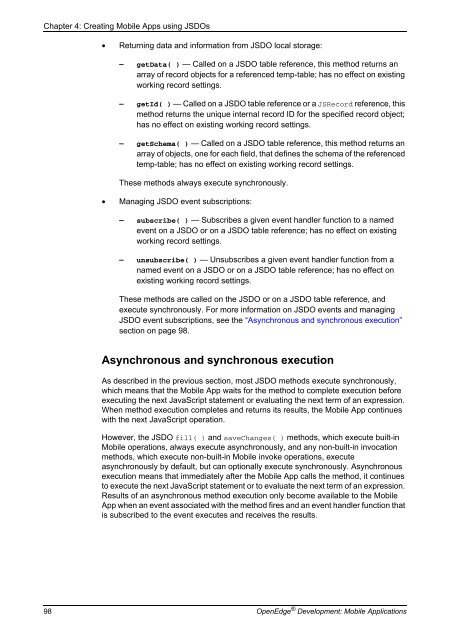OpenEdge Development: Mobile Applications - Product ...
OpenEdge Development: Mobile Applications - Product ...
OpenEdge Development: Mobile Applications - Product ...
You also want an ePaper? Increase the reach of your titles
YUMPU automatically turns print PDFs into web optimized ePapers that Google loves.
Chapter 4: Creating <strong>Mobile</strong> Apps using JSDOs<br />
• Returning data and information from JSDO local storage:<br />
– getData( ) — Called on a JSDO table reference, this method returns an<br />
array of record objects for a referenced temp-table; has no effect on existing<br />
working record settings.<br />
– getId( ) — Called on a JSDO table reference or a JSRecord reference, this<br />
method returns the unique internal record ID for the specified record object;<br />
has no effect on existing working record settings.<br />
– getSchema( ) — Called on a JSDO table reference, this method returns an<br />
array of objects, one for each field, that defines the schema of the referenced<br />
temp-table; has no effect on existing working record settings.<br />
These methods always execute synchronously.<br />
• Managing JSDO event subscriptions:<br />
– subscribe( ) — Subscribes a given event handler function to a named<br />
event on a JSDO or on a JSDO table reference; has no effect on existing<br />
working record settings.<br />
– unsubscribe( ) — Unsubscribes a given event handler function from a<br />
named event on a JSDO or on a JSDO table reference; has no effect on<br />
existing working record settings.<br />
These methods are called on the JSDO or on a JSDO table reference, and<br />
execute synchronously. For more information on JSDO events and managing<br />
JSDO event subscriptions, see the “Asynchronous and synchronous execution”<br />
section on page 98.<br />
Asynchronous and synchronous execution<br />
As described in the previous section, most JSDO methods execute synchronously,<br />
which means that the <strong>Mobile</strong> App waits for the method to complete execution before<br />
executing the next JavaScript statement or evaluating the next term of an expression.<br />
When method execution completes and returns its results, the <strong>Mobile</strong> App continues<br />
with the next JavaScript operation.<br />
However, the JSDO fill( ) and saveChanges( ) methods, which execute built-in<br />
<strong>Mobile</strong> operations, always execute asynchronously, and any non-built-in invocation<br />
methods, which execute non-built-in <strong>Mobile</strong> invoke operations, execute<br />
asynchronously by default, but can optionally execute synchronously. Asynchronous<br />
execution means that immediately after the <strong>Mobile</strong> App calls the method, it continues<br />
to execute the next JavaScript statement or to evaluate the next term of an expression.<br />
Results of an asynchronous method execution only become available to the <strong>Mobile</strong><br />
App when an event associated with the method fires and an event handler function that<br />
is subscribed to the event executes and receives the results.<br />
98 <strong>OpenEdge</strong> ® <strong>Development</strong>: <strong>Mobile</strong> <strong>Applications</strong>
















